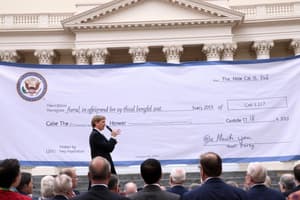Podcast
Questions and Answers
What prohibits legislative actions declaring someone guilty without a trial?
What prohibits legislative actions declaring someone guilty without a trial?
- Concurrent Powers
- Bill of Attainder (correct)
- Elastic Clause
- Ex Post Facto Law
Creeping categorization refers to the process of increasing autonomy in the use of block grants.
Creeping categorization refers to the process of increasing autonomy in the use of block grants.
False (B)
What is the primary purpose of the full faith and credit clause?
What is the primary purpose of the full faith and credit clause?
To require states to accept court decisions, public acts, and contracts of other states.
The process in which powers from the central government are delegated to subnational units is called __________.
The process in which powers from the central government are delegated to subnational units is called __________.
Match the following styles of federalism with their definitions:
Match the following styles of federalism with their definitions:
Which of the following best describes a categorical grant?
Which of the following best describes a categorical grant?
General revenue sharing requires strict guidelines for how state and local governments can spend funds.
General revenue sharing requires strict guidelines for how state and local governments can spend funds.
An __________ law is one that criminalizes an act retroactively and is prohibited under the Constitution.
An __________ law is one that criminalizes an act retroactively and is prohibited under the Constitution.
Flashcards
Cooperative Federalism
Cooperative Federalism
A style of federalism where national and state governments work together to solve problems, like a blended marble cake.
Ex Post Facto Law
Ex Post Facto Law
A law that makes something illegal after it already happened. Think of a rule changing after the game is over!
General Revenue Sharing
General Revenue Sharing
A type of grant with minimal restrictions, giving states and local governments more freedom to spend the money.
Devolution
Devolution
Signup and view all the flashcards
Dual Federalism
Dual Federalism
Signup and view all the flashcards
Elastic Clause
Elastic Clause
Signup and view all the flashcards
Bill of Attainder
Bill of Attainder
Signup and view all the flashcards
Categorical Grant
Categorical Grant
Signup and view all the flashcards
Study Notes
Bill of Attainder
- A legislative act declaring someone guilty without trial, prohibited by the Constitution.
Block Grant
- A grant type with fewer federal administrative conditions.
- Recipients have more flexibility in how to use the grant funds.
Categorical Grant
- Federal funds with limited recipient discretion.
- Recipients must adhere to strict administrative criteria.
Concurrent Powers
- Shared powers between states and the federal government.
- Examples include taxing, borrowing, lawmaking, and establishing court systems.
Cooperative Federalism
- A system where both levels of government work together to solve national problems.
- Layers of government are blended, resembling a marble cake.
Creeping Categorization
- A process where new administrative requirements are added to block grants.
- This might replace block grants with categorical grants.
Devolution
- A process where powers shift from the central government to subnational units within a unitary system.
Dual Federalism
- A system where states and the national government have separate authority.
- Their jurisdictions are clearly defined, creating a layer-cake model of federalism.
Elastic Clause
- Allows the national government to enact laws necessary for carrying out its constitutional duties.
- Found in Article I, Section 8.
Ex Post Facto Law
- A law that criminalizes an act retroactively.
- Prohibited by the Constitution.
Full Faith and Credit Clause
- Clause in Article IV, Section 1 of the Constitution.
- Requires states to honor court decisions, public acts, and contracts of other states.
General Revenue Sharing
- A type of federal grant with minimal conditions.
- States and local governments have flexibility in how to spend the money.
Immigration Federalism
- States gradually take on a role in immigration policies that were primarily federal.
New Federalism
- A style of federalism that emphasizes decentralization of policies.
- Aims to improve administrative efficiency, reduce public spending, and improve outcomes.
Nullfication
- A doctrine asserting that states can deem federal laws unconstitutional within their borders.
- Promoted by John Calhoun in the 1830s.
Privileges and Immunities Clause
- Clause in Article IV, Section 2 of the Constitution.
- Prevents states from discriminating against citizens of other states.
- Protects rights like access to courts, legal protection, and property rights.
Race-to-the-Bottom
- A competition among states to attract businesses.
- Often involves lowering taxes and regulations, sometimes to the detriment of workers.
Unfunded Mandates
- Federal laws imposing obligations on state and local governments.
- These mandates often do not provide full funding for them.
Venue Shopping
- A strategy where interest groups target the specific level of government.
- Groups select the governmental body most likely to support their policy goals.
Writ of Habeas Corpus
- A petition that enables someone in custody to challenge their detention in court.
- Used to determine whether detention is legal.
Federalism
- A system of government creating two levels.
- Levels of government have their own authority and capacity to act directly on individuals.
Unitay System
- A central government that holds substantial power.
- Subnational governments depend on the central government's authority.
Studying That Suits You
Use AI to generate personalized quizzes and flashcards to suit your learning preferences.




